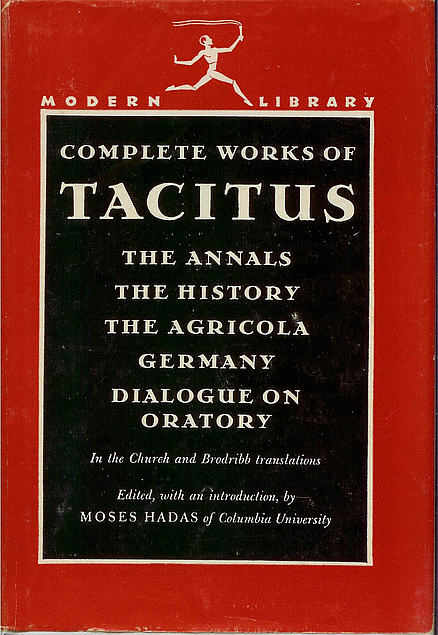|
Annals
By Tacitus Published around 100 AD 464 Pages Thibault’s Score: 3/5 The Annals, by Tacitus, is a history of the Roman Republic from the time of Tiberius (the second emperor) until Nero (the fifth emperor). The book is published in two volumes. The first covers the reigns of Tiberius, Caligula, and Claudius. The second focuses exclusively on Nero. I only read the first book closely, and skimmed the parts about Nero (you can only read so much about prostitutes in the palace). For most ancient books, I always read a physical copy when possible. By contrast, for more modern books, I listen to an audiobook when available. Tacitus is quite boring. He covers page after page of discussions in the senate, mostly focusing on plots and breaches of protocol. His history covers the dirty political tricks of a long forgotten era. Furthermore, without extensive pre-existing knowledge of the period, this book is extremely difficult. That being said, there are fascinating tid-bits that give insight into Roman life scattered here and there. The tidbits that most interested me were the ones that shed light into economic history. For example, there is an extensive discussion of a recession which occurred in 33 AD under Tiberius and the stimulus packages that were passed by the government to solve the problem. Another interesting tidbit is when Germanicus visits Egypt. The geographical descriptions of Egypt seem strange, because as far as I know, Egypt never included places like Armenia. Besides that they are good. They also discuss the presence of the phoenix, a magic bird, in Egypt. Finally, I enjoyed reading the intro blurb about how Augustus destroyed the republic covertly. Overall, Tacitus strikes me as an arch-conservative. He is nostalgic for long-lost republican virtues, and laments the present state of empire. Despite this, his political thinking would have been quite mainstream by the standards of his time. He doesn’t seem like he is a particularly free thinker - if anything, he strikes me as someone who likes to complain about politics. One last thing that struck me throughout the book is the importance of the Senate as an institution throughout the early empire. The emperors, especially Tiberius, are constantly struggling with the senate. The senate is often downplayed by modern historians, but seems like it was way more important than it is often made out to be. Parts of the book are missing. Especially chapters about Caligula. To me, it seems like they were censored. If I had to guess, roughly one third of the book is missing. I think that what he wrote upset later emperors, who ordered the offending chapters to be removed. Later monks dutifully copied the text with the absent passages. There are also some modern historiographical questions about the degree to which Tacitus may have been altered by later Christian authors to insert early references to Christians in the chapters concerning Nero. I have no idea if these historiographical questions are meaningful. It was fascinating, but just too dull. It is worth skimming if you are into Roman history but probably not worth reading cover to cover the way that I did.
0 Comments
|
Thibault SerletMost of my articles are book reviews, but I also write about many other topics. Archives
December 2023
Categories |

 RSS Feed
RSS Feed